AMD EPYC 7302P Benchmarks
For this exercise, we are using our legacy Linux-Bench scripts which help us see cross-platform “least common denominator” results we have been using for years as well as several results from our updated Linux-Bench2 scripts. Starting with our 2nd Generation Intel Xeon Scalable benchmarks, we are adding a number of our workload testing features to the mix as the next evolution of our platform.
At this point, our benchmarking sessions take days to run and we are generating well over a thousand data points. We are also running workloads for software companies that want to see how their software works on the latest hardware. As a result, this is a small sample of the data we are collecting and can share publicly. Our position is always that we are happy to provide some free data but we also have services to let companies run their own workloads in our lab, such as with our DemoEval service. What we do provide is an extremely controlled environment where we know every step is exactly the same and each run is done in a real-world data center, not a test bench.
We are going to show off a few results, and highlight a number of interesting data points in this article.
Python Linux 4.4.2 Kernel Compile Benchmark
This is one of the most requested benchmarks for STH over the past few years. The task was simple, we have a standard configuration file, the Linux 4.4.2 kernel from kernel.org, and make the standard auto-generated configuration utilizing every thread in the system. We are expressing results in terms of compiles per hour to make the results easier to read:
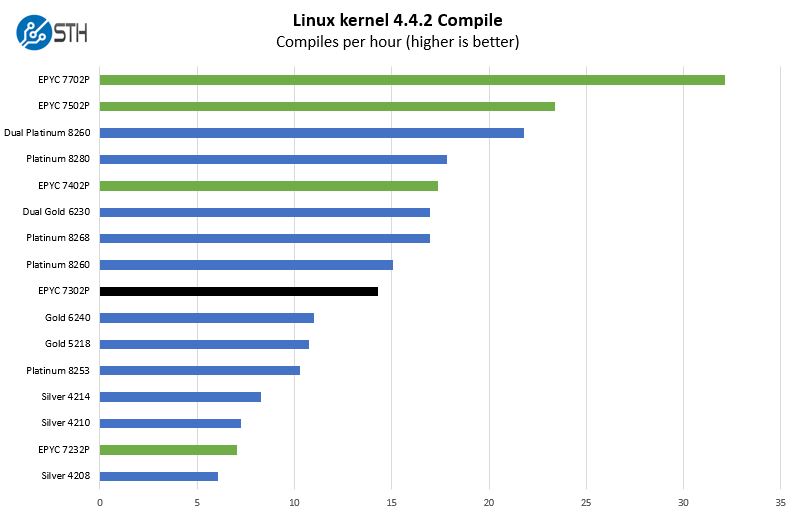
On our Linux Kernel Compile benchmark, you can see the impact of having fast cores, lots of cache, and plenty of memory bandwidth. The AMD EPYC 7302P performs just better than an Intel Xeon Gold 6240, albeit at a very different price point.
c-ray 1.1 Performance
We have been using c-ray for our performance testing for years now. It is a ray tracing benchmark that is extremely popular to show differences in processors under multi-threaded workloads. We are going to use our 8K results which work well at this end of the performance spectrum.
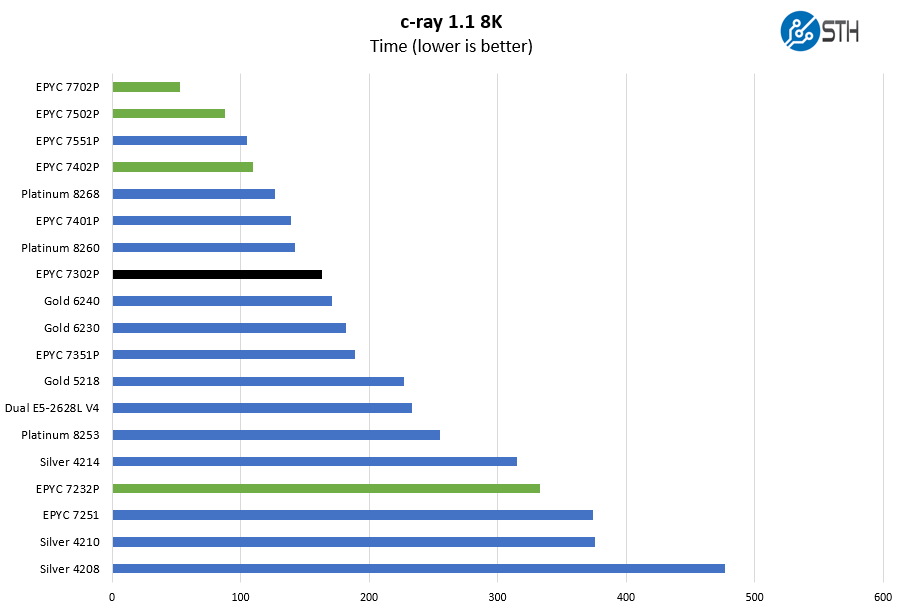
We added dual low-power Intel Xeon E5-2628L V4’s which were one of our favorite CPUs of that generation. Still, that is 24 cores of what was still Intel’s newest generation about two and a half years ago.
7-zip Compression Performance
7-zip is a widely used compression/ decompression program that works cross-platform. We started using the program during our early days with Windows testing. It is now part of Linux-Bench.
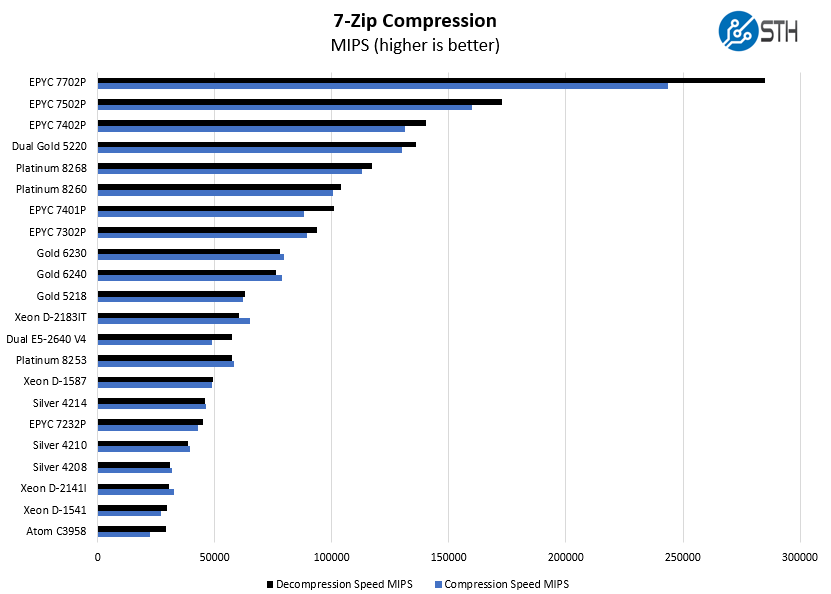
Here the AMD EPYC 7302P is fairly close to the AMD EPYC 7401P, the 24-core part of the previous generation.
NAMD Performance
NAMD is a molecular modeling benchmark developed by the Theoretical and Computational Biophysics Group in the Beckman Institute for Advanced Science and Technology at the University of Illinois at Urbana-Champaign. More information on the benchmark can be found here. With GROMACS we have been working hard to support AVX-512 and AVX2 supporting AMD Zen architecture. Here are the comparison results for the legacy data set:
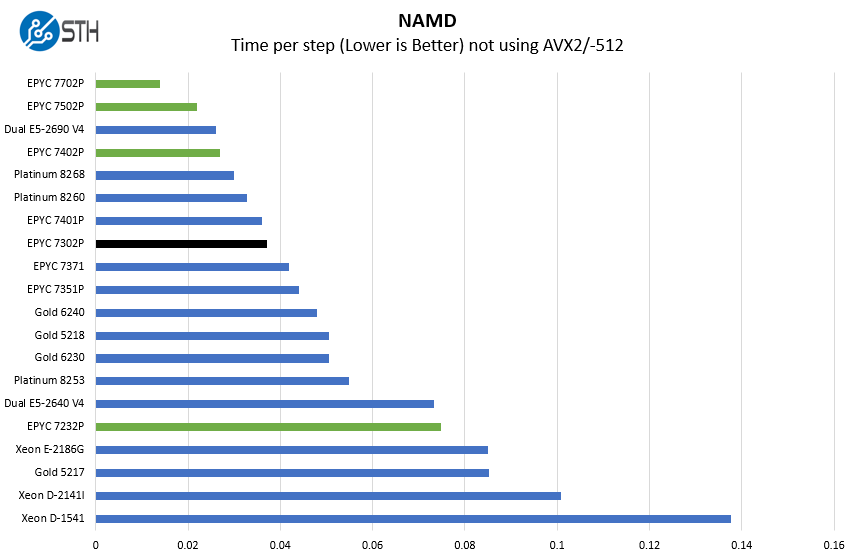
The AMD EPYC 7302P falls just short of the EPYC 7401P but ahead of the AMD EPYC 7371. That is impressive. When we did our AMD EPYC 7371 review, we found it offered great performance per core and actually beat the Intel Xeon Gold in Spec CPU 2017 integer tests. Now, that level of performance is available at half the cost from AMD.
OpenSSL Performance
OpenSSL is widely used to secure communications between servers. This is an important protocol in many server stacks. We first look at our sign tests:
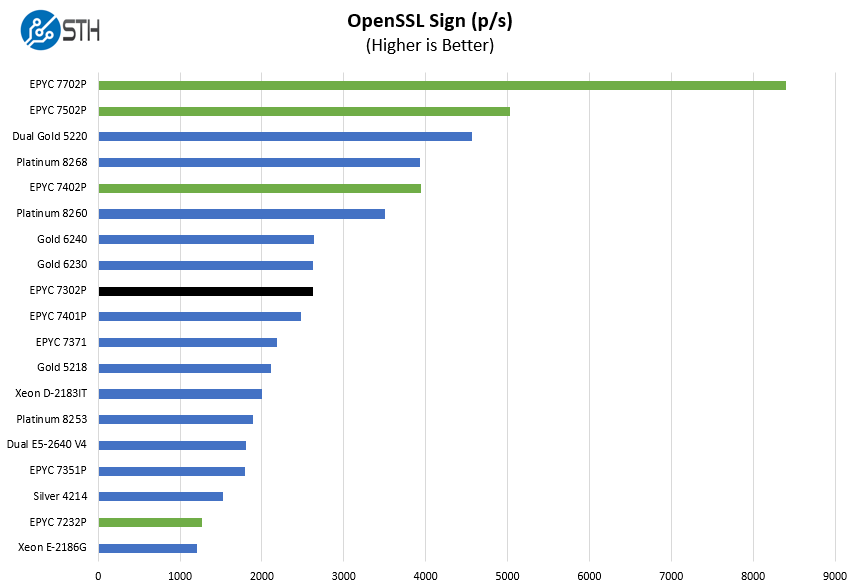
Here are the verify results:
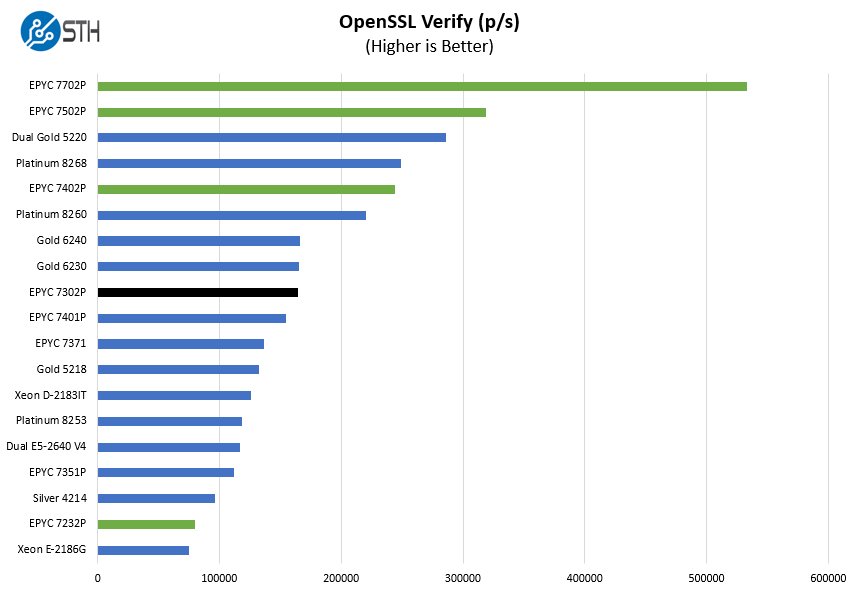
Here the AMD EPYC 7302P falls just short of the Intel Xeon Gold 6230. With the latest generation, Intel added 25% more cores and increased clock speeds. It is impressive that AMD is providing a similar level of performance from only 16 cores and at around 43% of the cost.
UnixBench Dhrystone 2 and Whetstone Benchmarks
Some of the longest-running tests at STH are the venerable UnixBench 5.1.3 Dhrystone 2 and Whetstone results. They are certainly aging, however, we constantly get requests for them, and many angry notes when we leave them out. UnixBench is widely used so we are including it in this data set. Here are the Dhrystone 2 results:
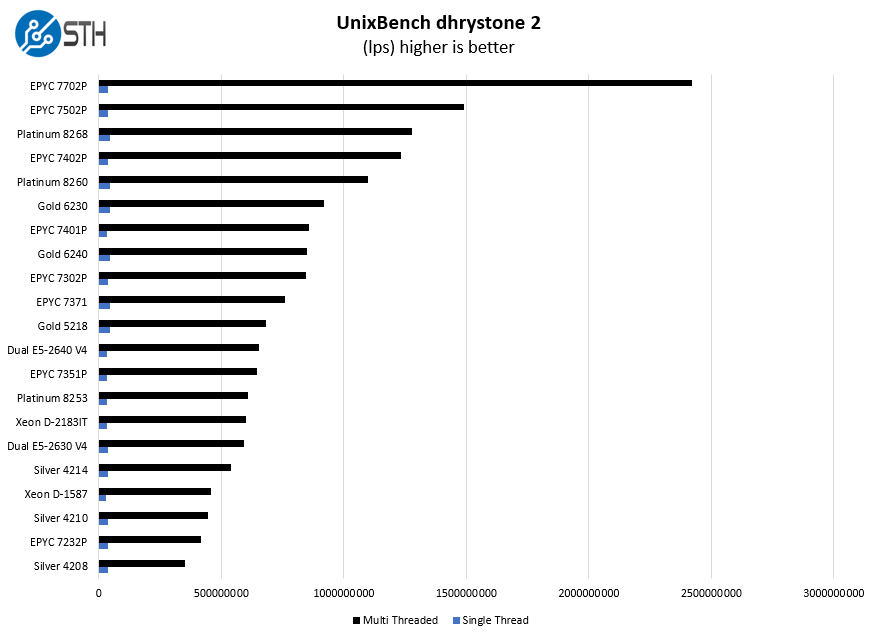
Here are the whetstone results:
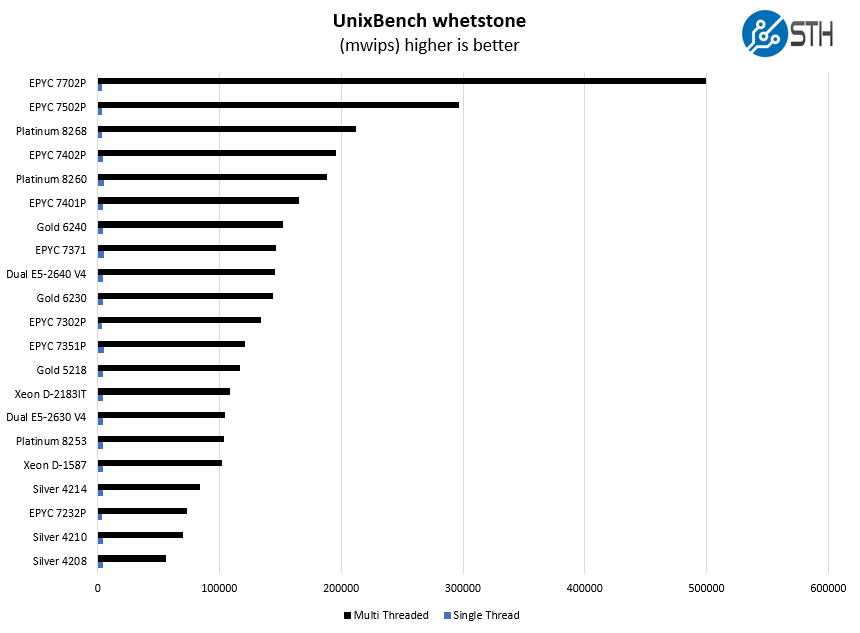
In a number of these charts, we also have the Intel Xeon D-2183T and the dual Intel Xeon E5-2640 V4. The Intel Xeon D-2183T represents the current top end of the Intel Xeon D range, something that Intel has been keen to use for single-socket deployments. Dual Intel Xeon E5-2640 V4’s were very popular as the most current generation in Q1 2017. Now, even with two of those CPUs that cost around $1000, a single AMD EPYC 7302P is able to reach similar levels of performance, house the same number of memory channels, and offer more and faster PCIe Gen4.
GROMACS STH Small AVX2/ AVX-512 Enabled
During our initial benchmarking efforts, we have found that our version of GROMACS was taking advantage of AVX-512 on Intel CPUs. We also found that it was not taking proper advantage of the AMD EPYC 7002 architecture. From our original AMD EPYC 7002 Series Rome Delivers a Knockout piece:
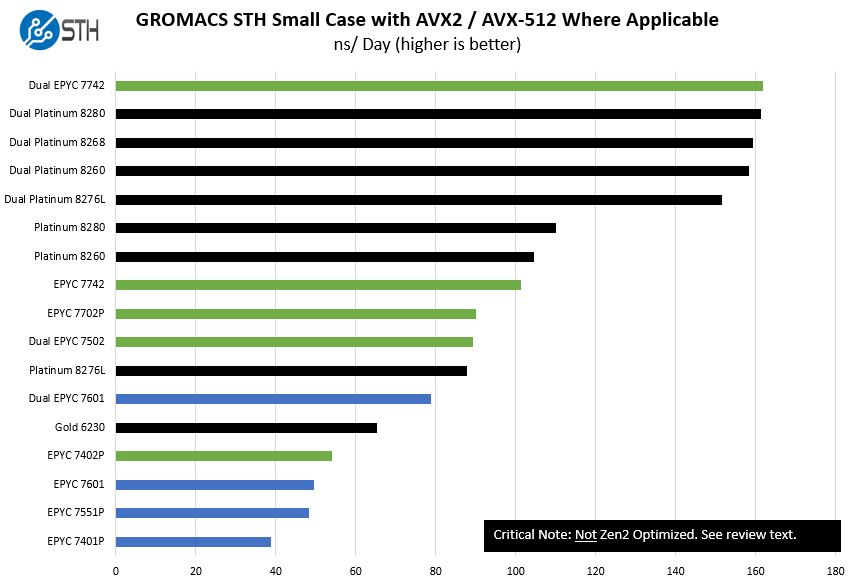
We have had one of the lead developers on our dual AMD EPYC 7742 machine and changes are being upstreamed. The initial results were putting dual AMD EPYC 7742’s at around 2.7x of dual Intel Xeon Gold 6148F parts which are a go-to HPC chip. The above will change significantly once this is changed, but not in time for this AMD EPYC 7302P review.
Instead of continuing to publish this benchmark, we are going to hold off until later in 2019 when those results get upstreamed. We still wanted to give some sense of what we saw on the legacy benchmark. At worst, as shown above, the chips are about even. When properly optimized, they are well ahead of Intel’s offerings.
Chess Benchmarking
Chess is an interesting use case since it has almost unlimited complexity. Over the years, we have received a number of requests to bring back chess benchmarking. We have been profiling systems and are ready to start sharing results:
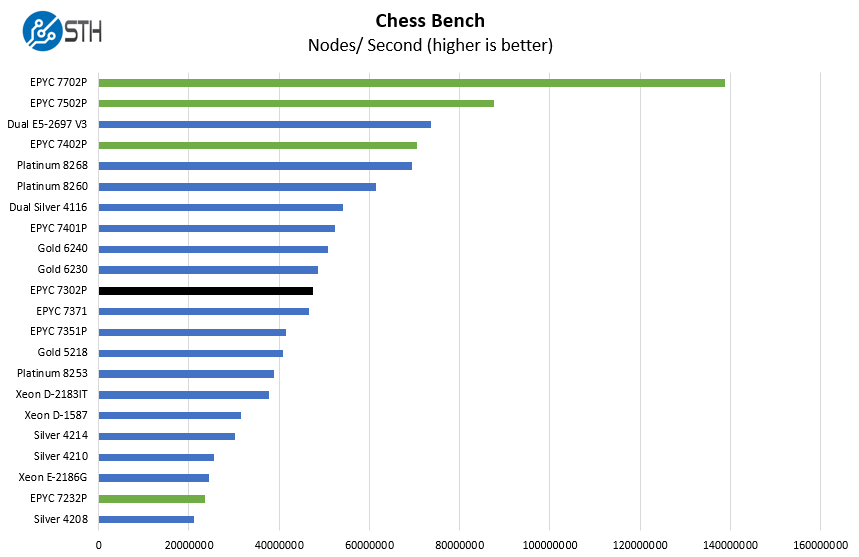
Again, we see performance between the AMD EPYC 7371 and the Intel Xeon Gold 6230 which is a very strong result. We also wanted to note that performance is around 2x of an Intel Xeon Silver 4208 CPU.
STH STFB KVM Virtualization Testing
One of the other workloads we wanted to share is from one of our DemoEval customers. We have permission to publish the results, but the application itself being tested is closed source. This is a KVM virtualization-based workload where our client is testing how many VMs it can have online at a given time while completing work under the target SLA. Each VM is a self-contained worker.
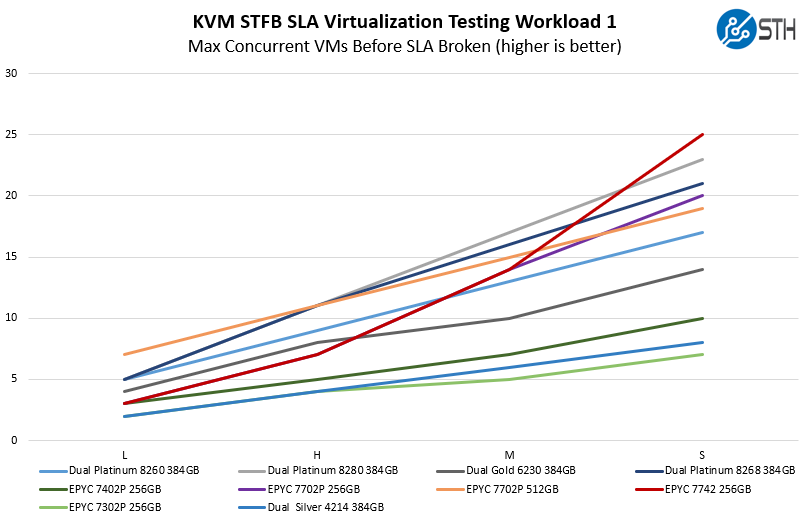
Here the single $825 list price AMD EPYC 7302P is very competitive with the dual Intel Xeon Silver 4214 $700 Intel part configuration. Since we are populating all memory channels, the dual Intel Xeon Silver 4214 setup is also using another 128GB of memory which makes that setup considerably more expensive for slightly better performance on the medium and small VM size tests.




I’ve been looking into this processor for my home server. I’ve been wanting to upgrade the Xeon 1245-V5 (skylake based LGA 1150 4 core 8 thread CPU) I’ve currently have, because I’m actually hitting a core limit with the VMs I wanna spin up.
My question, what ATX form factor motherboard would work best with this CPU? I have a standard ATX Mid tower case for that server PC, so I can’t go too much bigger than that…
Great article!
This is likely my next processor for my home AIO ZFS server. Just waiting on ATX/E-ATX motherboards that support PCI-E 4.0
Gigabyte MZ32-AR0 (rev. 1.0) supports PCIe 4.0
For home servers where density is not a concern, the EPYC 7282 offers even better perf/$, plus you can run it in dual-socket configurations.
MZ32-AR0 is E-ATX, no? So the only ATX options currently are Supermicro H11SSL and ASRock Rack EPYCD8.
Supermicro Rome mobos are still 1-2 months away:
https://forums.servethehome.com/index.php?threads/any-new-supermicro-motherboard-on-the-pipe-for-epyc-rome.25430/page-4#post-238228
Where can I buy a motherboard that supports Epyc Rome and 3200 speed DDR4?
@Daniel Gigabyte: https://www.gigabyte.com/Server-Motherboard/MZ01-CE1-rev-2x#ov there’s a review here, (of a previous rev.?): https://www.servethehome.com/gigabyte-mz01-ce1-review-an-amd-epyc-atx-gpu-motherboard/